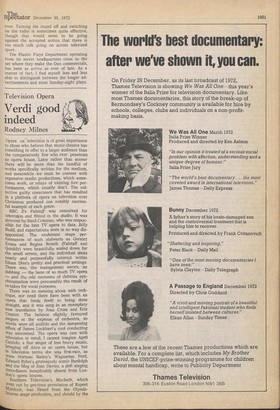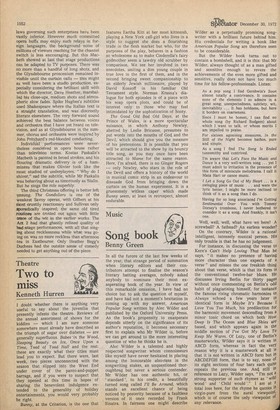Television Opera
Verdi good indeed
Rodney Milnes
Opera on'television is of great importance to those who believe that music-theatre has something to offer to a larger audience than the comparatively few who ever penetrate an opera house. Later rather than sooner there will be more than the handful of works specifically written for the medium, and meanwhile we must be content with expensive studio productions, which sometimes work, or relays of existing live performances, which usually don't. The collective guilty conscience that has resulted in a plethora of opera on television over Christmas produced one notably successful example of each genre.
BBC 2's Falstaff was conceived for television and filmed in the studio. It was directed by Basil Coleman, who was responsible for the best TV opera to date, Billy Budd, and expectations were in no way disappointed. The exuberant stage performances of such stalwarts as Geraint Evans and Regina Resnik (Falstaff and Quickly) were beautifully scaled down for the small screen, and the individual shots neatly and purposefully intercut within Eileen Diss's pretty and practical settings. There was, the management swore, no dubbing — the bane of so much TV opera -and the odd moments of dubious synchronisation were presumably the result of re-takes for vocal purposes.
There was no messing about with technique, nor need there have been with an Opera that lends itself to being done straight, and it was sung in an exemplary new translation by Joan Cross and Eric Crozier. The balance slightly favoured singers at the expense of orchestra, so Words were all audible and the dampening effect of James Lockhart's cool conducting Was minimised. The opera vvas cast with television in mind; I cannot imagine April Cantelo, a fine singer of less heavy music, bringing off Alice in an opera house, but in television terms she was first-rate, as Were Norman Bailey's Wagnerian Ford, Edward Byles's grotesquely comic Bardolph and the Meg of Joan Davies, a deft singing comedienne inexplicably absent from London's opera houses.
Southern Television's Macbeth, which went out by gracious permission of Rupert Murdoch, was filmed from the Glyndebourne stage production, and should by the laws governing such enterprises have been vastly inferior. However much committed opera buffs may enjoy such relays in foreign languages, the background noise of millions of viewers reaching for the channel switch is less encouraging. But this Macbeth showed at last that stage productions can be adapted to TV purposes. There was no more than a handful of long shots, and the Glyndeboume proscenium remained invisible until the curtain calls — this might as well have been a studio production, especially considering the brilliant skill with which the director, Dave Heather, marshalled his close-ups, medium shots and atmospheric slow fades. Spike Hughes's subtitles used Shakespeare where the Italian text is a straight translation, and was .discreetly literate elsewhere. The very forward sound achieved the best balance between voices and orchestra that I have yet heard on television, and as at Glyndebourne in the summer, 'chorus and orchestra were inspired by John Pritchard's red-blooded conducting.
Individiral performances were nevertheless conceived in opera house rather than television terms. Kostas Paskalis's Macbeth is painted in broad strokes, and his flowing dramatic delivery is of a hamminess that makes Olivier took like the most studied of umderplayers. "Why do I shiver," sad the subtitle, while Mr Paskalis was behaving about as timorously as 'Stalin. But he sings the role superbly.
The third Christmas offering is better left unsung. The Gondoliers is one of the Weakest Savoy operas, with Gilbert at his avast crustily reactionary and Sullivan only Sporadically 'inspired; the same old tired routines are trotted out again 'with little Iltvoe of the wit in the earlier works. The Acit 2 had that ghastly relined quality of bad stiage performances, with all that singing about recklessness while what was going on was no more reckless than afternoon tea in Eastbourne, Only Heather Begg's Duchess had the outsize sense of comedy needed to get anything out of the piece.



































 Previous page
Previous page